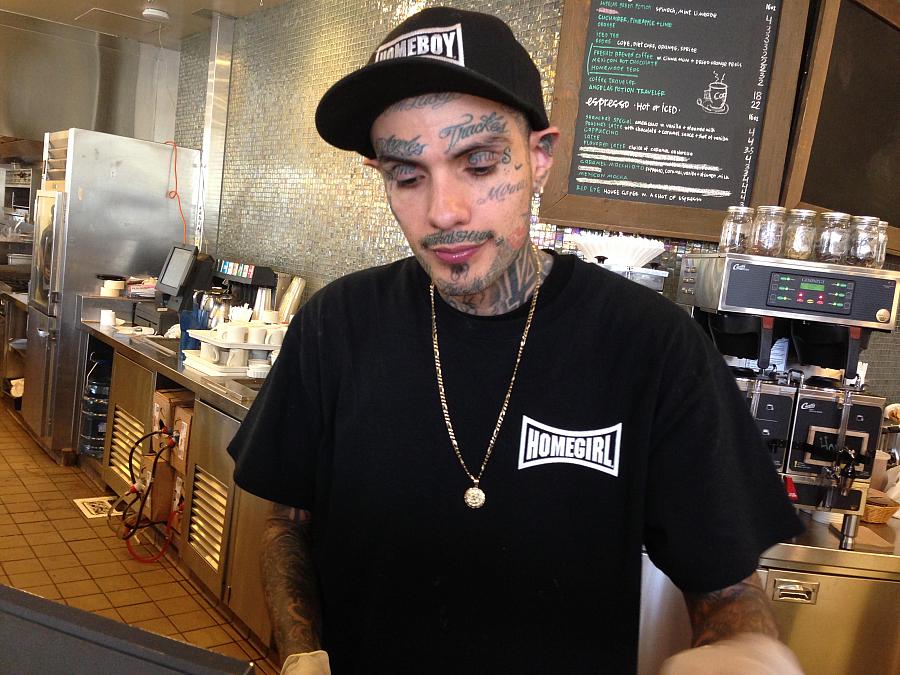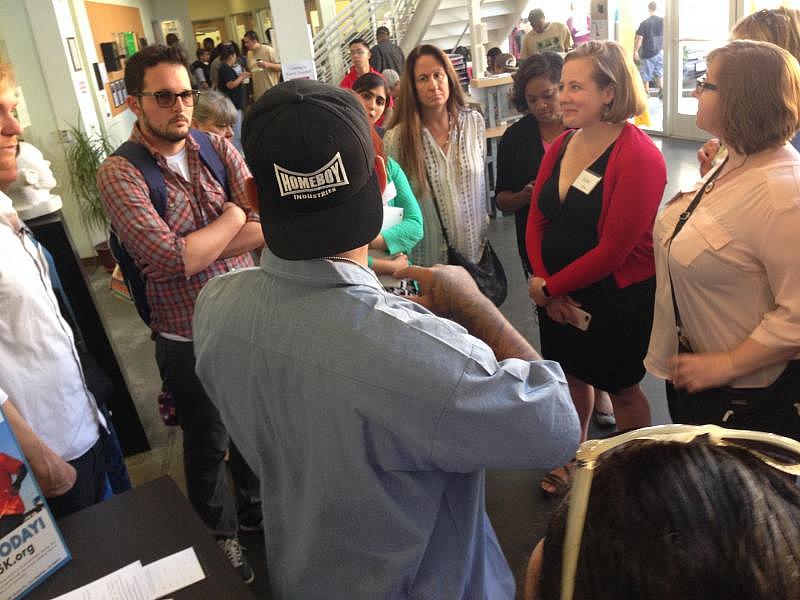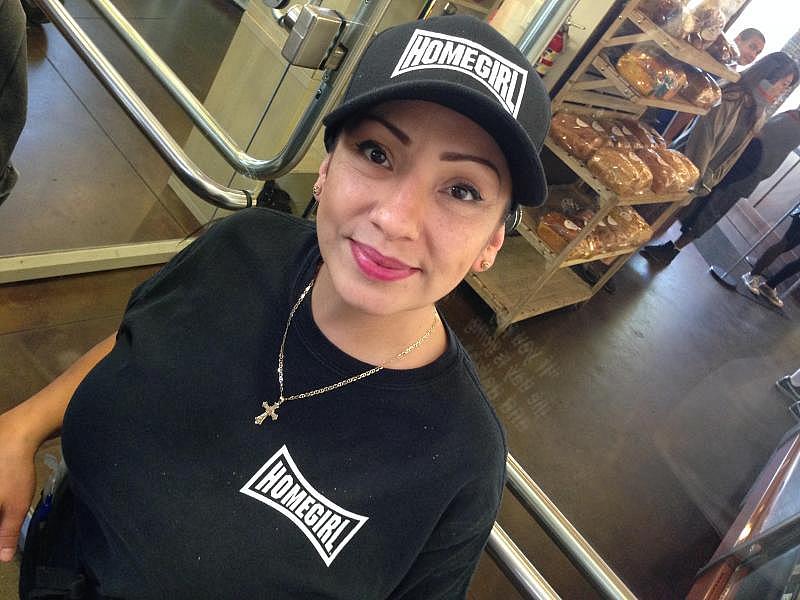A visit to Homeboy Industries shows the power of a T-shirt to change imperiled lives

“Homeboy Industries” settled in its current Los Angeles location a decade ago. The building is bright and open – lots of glass – and hard to hide. No one is invisible. My group of USC Annenberg Center for Health Journalism fellows filed in like we were supposed to be there, anxious to get a glimpse of a life most of us has likely never encountered or reported.
Our group was easy to spot — mostly white, mostly women, wearing nametags. We were told in advance to be “observers” and to cling to the edges until it was time to engage. The mostly Hispanic “homeboys” and “homegirls” walking through the doors were wearing nametags or badges, badges we quickly discovered were “badges of honor.” Almost everyone had on a “Homeboy Industries” T-shirt or baseball cap. Gang members who want out of that criminal lifestyle or already have a criminal record get three free T-shirts when they’re ready to become a “Homeboy.”

Carlos Caballeros was assigned to my group of journalists. The 21-year old was captivating in his storytelling and very honest about how resistant he was to turning his life around. Only after being stabbed in the leg, a scar he showed us, and stabbed in the back, did he consider joining the “Homeboy” cause started by the Rev. Gregory Boyle.
“Father Greg gave me my first job,” said Caballeros, who wears his black “Homeboy Industries” baseball cap turned backwards. The Boyle Heights neighborhood where Father Boyle works was located between two large public housing projects with the highest concentration of gang activity in Los Angeles at the time. Today, “Homeboy Industries” is believed to be the largest gang intervention, rehab and re-entry program in the world. Caballeros said completing the 18-month program led to him getting his GED, a CPR certificate, a welding certificate and he is now enrolled at East Los Angeles College.
During our visit, the success stories kept coming, all wearing “Homeboy” T-shirts. Katrina Lopez, 37 is working on an online associate’s degree, thanks to “Homeboy Industries.” She also shunned help at first, but changed her mind after hitting bottom when she found herself sitting on the floor in jail, seven months pregnant. Today Lopez is celebrating one year of being drug-free.
Inez Salcido, 41, told us about joining her mother at age 13 for a strong-armed robbery. Her mother and father died of AIDS, a result of drug use with contaminated needles. Salcido was living in the streets, under a highway, before she broke down. “What the hell has happened to me? What have I done?” she wondered at the time.
It was clear the level of hope and compassion Father Boyle has for his followers, but one woman in particular seemed to be the voice keeping Homeboys Industries’ participants in a safe, caring place. Theresa Karanik is a therapist who has spent the past decade listening and counseling the homeboys and girls who want to understand why their lives took such disturbing turns.

“Many of our clients have experienced complex trauma from sexual abuse, incarceration, separation from loved ones,” said Karanik. “But we accept people where they are.” There are three therapists on site, and 40 volunteer licensed therapists. That comes to about 300 sessions a month, Karanik said. She stressed the importance of taking a “customized approach” with each person. She sits the “homies” down and makes them as comfortable as possible, handing out whatever they need — snacks, condoms and even laundry detergent pods.
My mind was blown by the visit. Many of the people I bumped into would normally make me shiver, but not on this day. Before you could form an opinion about all the tattoos covering their arms, legs and some faces, that person was looking in your eyes and saying, “Good morning.”
Yes, we were sucked in. We were seeing first-hand the work of the famous “Homeboy Industries.” The only thing to do now was to head to the gift shop and take some of those positive feelings home. They were out of the shirt I wanted, the one flashing the saying, “Nothing stops a bullet like a job,” written on the back. So I purchased a simple burgundy t-shirt with “Homeboy Industries” on the front for my 17-year-old son Teemer, and a black apron reading “Homegirl” in pink letters, for me. There was a “Homegirl Café” featuring big healthy salads and delicious-looking brownies and red velvet cupcakes. The soup of the day – turkey cabbage!
In the days following our visit, I saw at least two Center for Health Journalism fellows sporting their “Homeboy Industries” T-shirts. Barrington Salmon is a freelance journalist from Washington, D.C. and writes for BlackPressUSA. “I am always interested in second chances,” said Salmon. “I know a lot of people who have needed second chances.”
Ruben Castaneda covers health and wellness issues for U.S. News & World Report and has written extensively about his addiction to drugs. On the last day of our fellowship, he wore his off-white T-shirt with “Homeboy Industries” written in black letters on the front. “I think they do an incredible job helping former gangsters turn their lives around,” said Castaneda, who has been drug-free for more than 20 years. “Buying a T-shirt was an easy way for me to support that effort in a small way.”
Father Boyle told our group “Homeboy Industries” has a 75 percent success rate of clients who do not return to prison. Those T-shirts may play a role. Caballeros, our tour guide, says no matter where he is, what he’s doing or who he’s hanging out with, he has never been arrested or targeted by police wearing a “Homeboy Industries” T-shirt. Respect.

